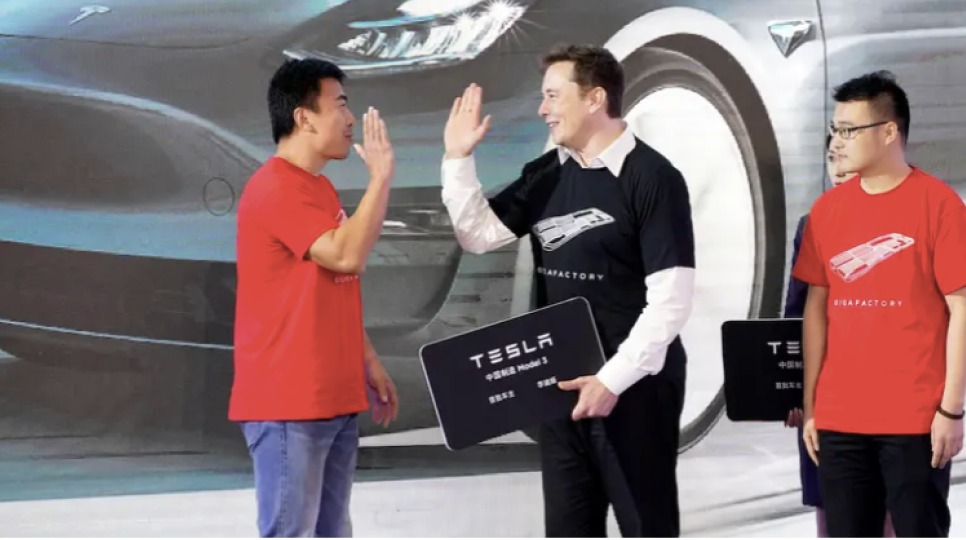
Friday July 31, 2020
Elon Musk’s Reputation as a Future-Looking CEO Is the Secret Behind Tesla’s High Share Price
Tesla’s High Stock That Defies Gravity
Tesla, the company of the future that brings out driverless cars, and which currently has a market share of only 1%, is surprisingly the highest-valued car company in the world, with a share price of $1,476 as of 29th July 2020. Its stock market value of $262 Billion is worth around three times the combined value of its top competitors Toyota, Volkswagen, and Ford.
The company’s second-quarter earnings report, released on 22nd July 2020, showed a net profit of $104Million. This resulted in a jump in the company’s share prices even further by 6%. But despite the company reporting a profit for the straight 4th quarter, the majority of the top analysts believe that the company is highly overvalued.
“Despite the modestly better 2Q, TSLA shares still highly overvalued, as evidenced by comparisons to industry leaders Toyota & VW which are together valued less than Tesla,” said Ryan Brinkman’s team at JP Morgan.
On WallStreet, only 7 analysts out of 36 are advising “buy” ratings, while 14 say to “sell”, and 15 suggest “hold”.
The share price is dependent on the current revenue of the company, as well as what the investors think the company would be worth in the future and how much it will grow.
Yes, Tesla has been making a profit since the last four quarters, but analysts are asking if this is sustainable. The analyst team of Patrick Hummel at UBS suggests a sell rating for Tesla because the shares are currently priced on the expectation that the company would sell more than a million cars by 2025 — which “is a stretch”, they say. Such things require “perfect execution”, strong growth in demand for electric vehicles, and a failure of other companies to launch electric vehicles, it said according to MarketWatch.
Usually, analysts’ predictions have an impact on the market as investors trust their judgement and they buy, sell or hold based on the majority view. But in the case of Tesla, it is not so.
Elon Musk More Influential Than the Analysts
If investors do not follow the analysts’ recommendations when it comes to Tesla, who exactly do they follow to make their financial decisions? Ironically, it is the CEO of the company Elon Musk.
On May 1, he tweeted what the analysts have been saying all along: “Tesla stock price is too high”.
Tesla stock price is too high imo
— Elon Musk (@elonmusk) May 1, 2020
That one tweet evaporated off $14 Billion from Tesla’s stocks. The share price dropped by 12%. The stock, which was trading at $760.23 just before his tweet, fell to a session low of $717.64, before falling even more, according to CNBC.
On 30th June, the shares rose by 8% when his email to employees mentioning that they are going to report a profit in the second quarter got leaked. As analysts continued to keep a sell rating of TSLA shares, Musk, on 23rd July 2020, told investors, on the second-quarter earnings conference call, that he is building a major insurance company. Tesla would use the data collected from its cars like how fast a person drives, and other factors that determine the chances of an accident, to offer cheaper premiums to its drivers.
This, along with the 2nd quarter profits, made people continue to buy Tesla shares. With an increase in people buying the shares, the prices went up and the market value of the company increased. In essence, he increased the market value of his company by announcing a new insurance product which does not even exist yet even as his first insurance product had a botched rollout.
Why do investors believe so strongly in Elon Musk to provide results that experts say might be hard to achieve? Why does the market agree with him?
The Power of the Story of a Utopian Future
Musk happens to be very clear on his views on AI for many years now. “AI is far more dangerous than nukes,” he has said famously. At the same time, his company brings out driverless cars. He also runs an Artificial Intelligence company OpenAI that just released a commercial tool that he had initially called “dangerous”. The tool is currently easily available as a beta version for anyone to use, even when he has said in the past that regulations are a necessity when it comes to AI.
These seemingly conflicting views don’t seem to deter his supporters — and probably add to his appeal. Him investing in AI allows him to invest in an industry that is going to become more and more important in the future, while his views against AI sets him apart from his competitors like Larry Page and Mark Zuckerberg, who are both very keen and optimistic about the improvements the technology will bring into our lives.
He has created a brand image for himself as a person with a vision for the future. He has emotional intelligence, and he says what people want to hear. For example, he has said that he builds companies to solve problems based on their importance, not on his likelihood of success. People trust him and believe that he will do the right thing.
Musk is passionate about research and innovation. And he is able to communicate that passion to others. “Musk clearly fits the visionary mode, dreaming big, convincing customers, employees and investors to buy into his dreams,” wrote Aswath Damodaran, a teacher of corporate finance and valuation at New York University Business School. That is why amidst a pandemic, in a risky automotive industry where vehicle parts come from China, and people don’t have money to buy vehicles at the moment — Tesla’s stocks keep on riding on a “wave of hype”. People want to believe — and invest — in a future where they have clean energy, can live on Mars, have driverless cars, cheap insurance, and don’t have to spend hours in traffic. And as The New York Times says, “Tesla is about nothing if not a utopian future…”
Damodaran has called Tesla a “story stock” — i.e. shares that have no semblance to financial fundamentals. It is because a story hits people emotionally rather than rationally. That is why Tesla is valued higher than Toyota, even though the latter sold 30 times more cars than the former last year.
With Power Comes Responsibility
The case of Tesla and Elon Musk shows how a strong CEO profile can have a high impact on a company’s stock price. Besides Musk, Amazon’s Jeff Bezos also has a strong CEO profiling. It gives them the power to control the brand and the reputation of their companies and as a result, the companies’ stock prices.
This power comes with a lot of responsibility as a reputation is built on transparency and honesty. With the rise in social media and transparency, reputation has become even more fragile. Remember what happened with Facebook, Mark Zuckerberg, and Cambridge Analytica? Business leaders need to handle the power with respect and not misuse it.
Bahareh has over 15 years of experience in the financial services, technology and legal sector with expertise in marketing, performance & strategic analysis, managing client relationships, and business development. She can be reached at bahareh@curzonpr.com
Curzon PR is a London-based PR firm working with clients globally. If you have any questions, please feel free to contact our Business Development Team bd@curzonpr.com







Follow us